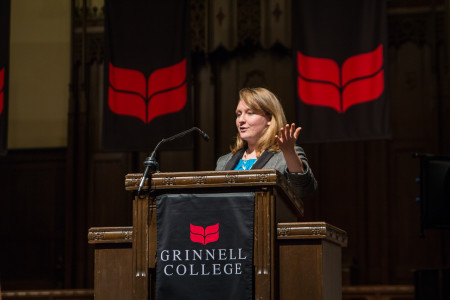By Lily Bohlke
bohlkeli@grinnell.edu
On Tuesday night, two women, Maria Vertkin and Deborah Ahenkorah, were presented with the Grinnell College Innovator for Social Justice Prize.
According to the College’s website, the Grinnell Prize is a way to extend Grinnell’s historic commitment to social justice beyond the students and faculty, awarding the prize of $100,000 to someone outside the community who has also shown a dedication to social justice.
President Raynard Kington said that in this spirit of social justice creativity and innovation, both Vertkin and Ahenkorah’s organizations are perfect fits for the prize.
Vertkin founded the organization Found in Translation out of Boston. Found in Translation helps low-income, multilingual women in the United States become involved in a career of medical interpreting. Medical interpreters earn salaries which are commensurate to people with a Master’s degree, but a medical interpreter certificate takes much less time and is much cheaper.
“Because immigrants are concentrated in low-income communities, so is language skill. Language skill is something that is marketable and you can use it to get a well-paying job that permanently gets you out of poverty,” Vertkin said in an interview.
Emigrating first to Israel and later the United States from Russia, Vertkin saw the many challenges immigrants face first-hand. Through social work, she further saw the overrepresentation of minorities, including immigrants, in low-income communities. In order to help some of these women leave poverty, she found the profession of medical interpretation to be an outstanding tool.
“I thought, ‘I’ve solved it. I’m a genius,’” Vertkin said in her speech. “I quickly realized that it was a naïve idea and that it’s not that simple. There are barriers standing in the way of the people I think would make great interpreters, but it has nothing to do with how good they would be.”
Vertkin proposed a program that would help women get over these barriers to taking the course, such as lack of tuition money, childcare or transportation methods, and was awarded the Kip Tiernan Social Justice Fellowship, which gave her the means to start Found in Translation.
Found in Translation is a young organization. With the help of the Grinnell Prize, Vertkin hopes to expand to other metropolitan areas. She also hopes to develop a social enterprise in which the organization will provide medical interpretation services for a fee.
“That enables us to help our women get jobs faster, get paid faster, qualify for other jobs that require prior experience and have a safer service revenue stream to help us become sustainable without fear of a grant running out,” Vertkin said in an interview.
President Kington praised Vertkin for “her innovative effort to empower low-income women with language skills and simultaneously reduce disparities in health care.”
Ahenkorah’s organization, Golden Baobab, is an NGO dedicated to children’s happiness in Africa. Every year she holds a competition for African writers to write children’s stories featuring African children. She then helps the winning stories get published and distributed. This year, Golden Baobab expanded its mission by starting its own independent publishing company.
When Ahenkorah was young and growing up in Ghana, she loved to read. Books were expensive at the bookstore, however, so when a library out of a painted shipping container was opened, it “changed [her] life.”
“One day, I saw the woman who set up the library and it was a wake-up moment for me because I realized an actual human being did this,” Ahenkorah said in an interview. “She made all of my book love dreams come true and it inspired me.”
When she came to the United States to attend Bryn Mawr College, Ahenkorah began collecting children’s books and sending them to libraries in different regions of Africa. Then one day she saw a picture of an African girl in one of the books and realized that the children receiving these books were not represented in them.
“It can’t really be rocket science to get them African books,” Ahenkorah said in her speech.
To help remedy this problem, Ahenkorah created the Golden Baobab literature prize as a way to get African stories to African children. The organization helps connect the winners to publishing opportunities and then helps get the books to children across the continent.
According to Ahenkorah, creating books that picture African children is important to legitimize their identities.
“Growing up in Ghana, I would read all this American slang and I would think that’s the way to talk,” she said in an interview. “My slang is also important, but I didn’t think it was because it wasn’t legitimized in the books I read.”
While Ahenkorah believes that there are still many important issues related to the health and nutrition of children in Africa, she also sees a special place in her organization in raising the spirits of children across the continent.
In her speech, Ahenkorah painted a picture of a crowded market and a tomato seller with her child next to her on the floor. But instead of just sitting idly on the floor, the child is reading and enjoying a book.
“We haven’t solved the hygiene problem, because kids are still on the ground by their mothers, but they’re happy,” Ahenkorah said. “Their minds are away from where they are even though there are huge problems around the African continent. We can still maintain something in our heads that helps us to rise above the problems.”
For both Vertkin and Ahenkorah, the Grinnell Prize will be a great help to expanding their organizations.
“Finding places like Grinnell [that] believe in us and are willing to support us is immense,” Ahenkorah said.




















































